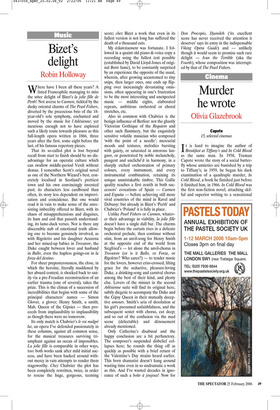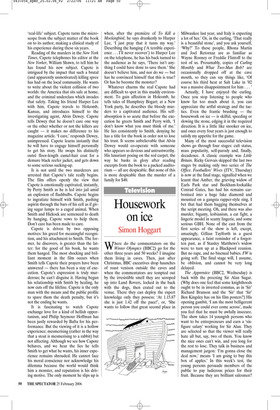Murder he wrote
Olivia Glazebrook
Capote 15, selected cinemas
It is hard to imagine the author of Breakfast at Tiffany’s and In Cold Blood as the same man. In 1958, Truman Capote wrote the story of a social butterfly whose anxieties are banished by a trip to Tiffany’s; in 1959, he began his dark examination of a quadruple murder, In Cold Blood, a book he finished just before it finished him, in 1966. In Cold Blood was the first non-fiction novel, attaching skilful and superior writing to a sensational ‘real-life’ subject. Capote turns the microscope from the subject matter of the book on to its author, making a clinical study of his experience during these six years.
Reading of the murders in the New York Times, Capote telephones his editor at the New Yorker, William Shawn, to tell him he has found his new subject. Capote is intrigued by the impact that such a brutal (and apparently unmotivated) killing spree has had on the local community. He wants to write about the violent collision of two worlds: the America that sits safe at home, and the criminal underclass which invades that safety. Taking his friend Harper Lee with him, Capote travels to Holcomb, Kansas, and introduces himself to the investigating agent, Alvin Dewey. Capote tells Dewey that he doesn’t care one way or the other whether or not the killers are caught — it makes no difference to his magazine article. ‘I care,’ responds Dewey, unimpressed. Capote learns instantly that he will have to engage himself personally to get his story. He swaps his distinctly outré floor-length camel-hair coat for a demure black reefer jacket, and gets down to some serious sucking-up.
It is not until the two murderers are arrested that Capote’s tale really begins. The film offers openly the view that Capote is emotionally captivated, instantly, by Perry Smith as he is led into jail amid an explosion of flashbulbs. Capote begins to ingratiate himself with Smith, pushing aspirin through the bars of his cell as if giving sugar lumps to a caged animal. When Smith and Hickock are sentenced to death by hanging, Capote vows to help them. Don’t care has been made to care.
Capote is driven by two opposing motives: his greed for meaningful recognition, and his attachment to Smith. The former, he discovers, is greater than the latter: for the good of his book, he wants them hanged. The most shocking and brilliant moment in the film occurs when Smith tells Capote their prayers have been answered — there has been a stay of execution. Capote’s expression is truly murderous; he can’t disguise it. Having begun his relationship with Smith by healing, he now cuts off the lifeline. Capote is the only man with the means and the public profile to spare them the death penalty, but it’s not the ending he wants.
It is fascinating to watch Capote exchange love for a kind of hellish opportunism, and Philip Seymour Hoffman has been justly rewarded by Bafta for his performance. But the viewing of it is a hollow experience; mesmerising (rather in the way that a stoat is mesmerising to a rabbit) but not affecting. Although we see how Capote behaves, and we hear the lies he tells Smith to get what he wants, his inner experience remains shrouded. He cannot face his moral conscience nor acknowledge his dilemma because the world would think him a monster, and reputation is his driving motive. The only moment he slips up is when, after the première of To Kill a Mockingbird, he says drunkenly to Harper Lee, ‘I just pray that it turns my way.’ Describing the hanging (‘A terrible experience ... I’ll never recover’) to Harper Lee on the telephone, he has his back turned to the audience as he says, ‘There isn’t anything I could have done to save them.’ She doesn’t believe him, and nor do we — but has he convinced himself that this is true? Or has he become the monster?
Whatever charms the real Capote had are difficult to spot in this muddy environment. To gain affection in Holcomb, he tells tales of Humphrey Bogart; at a New York party, he describes the bloody murders to a captivated audience. His selfabsorption is so acute that before the execution he greets Smith and Perry with, ‘I don’t know what you must think of me.’ He lies consistently to Smith, denying he has a title for the book in order not to lose his trust. It seems unbelievable that Alvin Dewey would co-operate with someone who appears so devious and untrustworthy. His luxuriant posing on the red carpet, the way he basks in glory after reading excerpts from the book to a packed auditorium — all are despicable. But none of this is more despicable than the murder of a family for $40.



































































 Previous page
Previous page